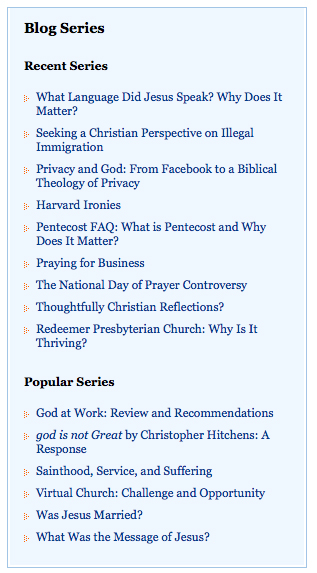This is one blog series I wish were completely unnecessary. I wish conflict among Christians were a relatively insignificant problem. I wish we who believe in Jesus could experience the unity he commended to us (John 17:20-24). I wish there wasn’t animosity within churches and denominations.
 But all of this is, I admit, wishful thinking. The fact is that Christians often have a hard time getting along with each other. This has been true from the earliest days of the church. The Apostle Paul, who planted the church in Corinth, wrote what we call 1 Corinthians to the believers there principally because of internal conflict in the church. By the time Paul wrote 2 Corinthians, the tension was largely between Paul and his church.
But all of this is, I admit, wishful thinking. The fact is that Christians often have a hard time getting along with each other. This has been true from the earliest days of the church. The Apostle Paul, who planted the church in Corinth, wrote what we call 1 Corinthians to the believers there principally because of internal conflict in the church. By the time Paul wrote 2 Corinthians, the tension was largely between Paul and his church.
Even in a healthy church, such as the one in Philippi, conflict was a problem. Thus Paul wrote in his letter to the Philippians: “I urge Euodia and I urge Syntyche to be of the same mind in the Lord. Yes, and I ask you also, my loyal companion, help these women, for they have struggled beside me in the work of the gospel, together with Clement and the rest of my co-workers, whose names are in the book of life” (Phil 4:2-3). Two prominent women in the Philippian congregation, people who had been Paul’s co-workers in ministry, were stuck in some sort of conflict such that they needed help from Paul and others to try and get along.
When I was a young Christian, I used to think that the solution to the ills of the contemporary church was to “get back to the early church.” If we could only believe and do as the first believers believed and did, we’d be on the right track. But the more I have studied the early church, the more I have come to recognize the manifold problems that plagued the first Christians. Among these, conflict played a central role.
Perhaps one of the most discouraging things about studying church history, from the first century onward, is to see just how often Christians have been mired in disputes and strife. Sometimes, in our worst moments, we have actually put to death fellow Christians whose theological convictions didn’t measure up to our personal standards. Not a happy story, not at all.
This was not what Jesus intended, to be sure. In his so-called “High Priestly Prayer” recorded in John 17, Jesus prayed:
“I ask not only on behalf of these, but also on behalf of those who will believe in me through their word, that they may all be one. As you, Father, are in me and I am in you, may they also be in us, so that the world may believe that you have sent me. The glory that you have given me I have given them, so that they may be one, as we are one, I in them and you in me, that they may become completely one, so that the world may know that you have sent me and have loved them even as you have loved me.” (John 17:20-23)
A little earlier, Jesus had said to his disciples: “By this everyone will know that you are my disciples, if you have love for one another” (John 13:35). To be sure, there are times when followers of Jesus do love each other in an exemplary way. But, far too often, such love is marred by conflict, tension, and outright meanness. And, far too often, we have not dealt with these problems in a loving way.
So, today I begin a blog series that seeks God’s guidance for Christians in conflict. This series will be relevant, I believe, to one-on-one relationships and to denominational disagreements. I will seek to discover and apply God’s revealed wisdom to conflict among Christians. My hope is that when we experience conflict in the church, we will be prepared to deal with it in a way that honors God and strengthens Christian community.
Tomorrow I’ll suggest a place where we might start when facing the problem of conflict among Christians.

